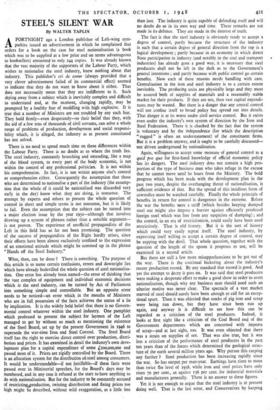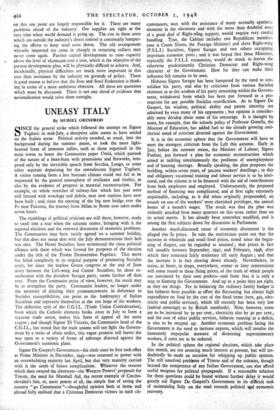STEEL'S SILENT WAR
By WALTER TAPLIN
AFORTNIGHT ago a London publisher of Left-wing sym- pathies issued an advertisement in which he complained that orders for a book on the case for steel nationalisation (a book which was to be supplied at a low price and on terms advantageous to booksellers) amounted to only 244 copies. It was already known that the vast majority of the supporters of the Labour Party, which wishes to nationalise the steel industry, knew nothing about that industry. This publisher's cri de coeur (always provided that a very clever advertisement failed of its commercial effect) seemed to indicate that they do not want to know about it either. That does not necessarily mean that they are indifferent to it. Such shying away from a subject which is inevitably complex and difficult to understand and, at the moment, changing rapidly, may be prompted by a healthy fear of meddling with high explosive. It is true that a number of Ministers are not troubled by any such fear. They hold firmly—even desperately—to their belief that they, with the aid of a few tens of thousands of civil servants, can solve a whole range of problems of production, development and social responsi- bility which, it is alleged, the industry as at present constituted has not solved.
There is no need to spend much time on these differences within the Labour Party. There is no doubt as to where the truth lies. The steel industry, constantly branching and extending, like a map of the blood system, to every part of the body economic, is not within the control of any professional politician. It is not within his comprehension. In fact, it is not within anyone else's control or comprehension either. Consequently the assumption that those who are determined to nationalise a part of the industry (the assump- tion that the whole of it could be nationalised was discarded very early in the day) know what they are doing, is nonsense. The attempt by experts and others to present the whole question of control in short and simple terms is not nonsense, but it is likely to fail. Even the assumption that the subject can be turned into a major election issue by the year 1950—although that involves drawing up a system of phrases rather than a sensible argument— is not proven. The experience of unofficial propagandists of the Left in this field has so far not been promising. The question of the success of propagandists of the Right hardly arises, since their efforts have been almost exclusively confined to the expression of an emotional attitude which might be summed up in the phrase "Hands off the Steel Industry."
What, then, can be done ? There is something. The purpose of this article is to name certain confusions, errors and downright lies which have already bedevilled the whole question of steel nationalisa- tion. One error has already been named—the error of thinking that the vast complex of equipment and individual economic decisions which is the steel industry, can be turned by Act of Parliament into something simple and controllable. But an opposite error needs to be noticed—an error which in the mouths of Ministers who are in full possession of the facts achieves the status of a lie by implication. It is the widely held belief that there is no Govern- mental control whatever within the steel industry. One pamphlet which professed to present the subject for laymen of the Left managed to get by without so much as mentioning the existence of the Steel Board, set up by the present Government in 1946 to supersede the war-time Iron and Steel Control. The Steel Board itself has the right to exercise direct control over production, distri- bution and prices. It has examined in detail the industry's own deve- lopment plan for a capital expenditure of some £2oo,000,000 and passed most of it. Prices are rigidly controlled by the Board. There is an allocation system for the distribution IA steel among consumers. It would be understandable—if not justifiable-4f these facts were passed over in Ministerial speeches, for the Board's days may be numbered, and in any case it refused at the start to have anything to do with nationalisation. But for the industry to be constantly accused of restrictingoproduction, twisting distribution and fixing prices too high might be described, without wild exaggeration, as a little less
than just. The industry is quite capable of defending itself and will no doubt do so in its own way and time. These remarks are not made in its defence. They are made in the interest of truth.
The fact is that the steel industry is obviously ready to accept a degree of control, partly because the structure of the industry is such that a certain degree of general direction from the top is a logical development ; partly because in an economy in which direct State participation in industry (and notably in the coal and transport • industries) has already gone a good way, it is necessary that steel producers shall not be left in the dark as to the Government's general intentions ; and partly because with public control go certain benefits. Now each of these reasons needs handling with care. Centralisation in the iron and steel industry is to a certain extent inevitable. The producing units are physically large and they must be assured both of supplies of materials and a reasonably stable market for their products. If they are not, then vast capital expendi- tures may be wasted. But there is a danger that any central control will not confine itself to broad policy but spread out into details. That danger is at its worst under civil service control. But it exists even under the industry's own system of direction by the Iron and Steel Federation. There it is checked by the fact that the system is voluntary and by the independence (for which the description " rugged " is often an understatement) of the constituent firms. But it is a problem anyway, and it ought to be carefully discussed— not driven underground by nationalisation.
Again, willingness to accept some measure of general control as a quid pro quo for first-hand knowledge of official economic policy has its dangers. The steel industry does not contain a high pro- portion of the type of business man who takes refuge in the excuse that he cannot move until he hears from the Ministry. The bold progress which has been made with the development plan in the past two years, despite the overhanging threat of nationalisation, is sufficient evidence of that. But the spread of this insidious form of cowardice must be watched carefully. Finally the whole principle of benefits in return for control is dangerous in the extreme. Before the war the benefits were a tariff (which besides keeping dumped steel out might also impose a barrier against efficiently produced foreign steel which was free from any suspicion of dumping) ; and the control, in an era of restrictionism, could easily have been used restrictively. That is old history. But it is the sort of history which could very easily repeat itself. The steel industry, by expressing itself willing to accept a certain degree of control, may be supping with the devil. That whole question, together with the question of the length of the spoon it proposes to use, will be examined in a second article.
But there are still a few more misapprehensions to be got out of the way. There is the continual bickering about the industry's recent production record. By any standard that record is good. And yet the attempt to decry it goes on. It was said that steel producers were making a desperate effort to make a good show in order to avert nationalisation, though why any business man should need such an ulterior motive was never clear. The spectacle of a vast market starved of steel should surely have been enough to call for an excep- tional spurt. Then it was objected that stocks of pig iron and scrap were being run down, but they have since been run up again, and anyway it is difficult to see how this can be regarded as a criticism of the steel producers. Indeed, it looks at first sight like a criticism of the Coal Board and of the Government departments which are concerned with imports of scrap—and at last sight, too. It was even objected that there was a strain on supplies of ore. That was also true, but it was less a criticism of the performance of steel producers in the past ten years than of the forces which determined the geological struc- ture of the earth several million years ago. Why pursue this carping any further ? Steel production has been increasing rapidly since the war. So has output per man-year. Earnings have risen to more than twice the level of 1938, while iron and steel prices have only risen 70 per cent., as against 136 per cent. for industrial materials and manufactures generally. There is no answer to these figures.
Yet it is not enough to argue that the steel industry is at present doing well. That is the last error, and Conservatives by harping on this one point are largely responsible for it. There are many problems ahead of the industry. Ore supplies are tight at the very time when world demand is going up. The rise in these costs which are outside the industry's direct control is continually hamper- ing the efforts to keep total costs down. The old arrangement whereby imported ore came in cheaply in returning colliers may never come again. Further capital development to raise capacity above the level of 16,000,000 tons a year, which is the objective of the present development plan, will be physically difficult to achieve. And, incidentally, physical difficulties are much more important in this case than resistance by the industry on grounds of policy. There is good reason to believe that the Iron and Steel Federation is think- ing in terms of a more ambitious objective. All these are questions which must be discussed. There is not one shred of evidence that nationalisation would solve them outright.



































 Previous page
Previous page